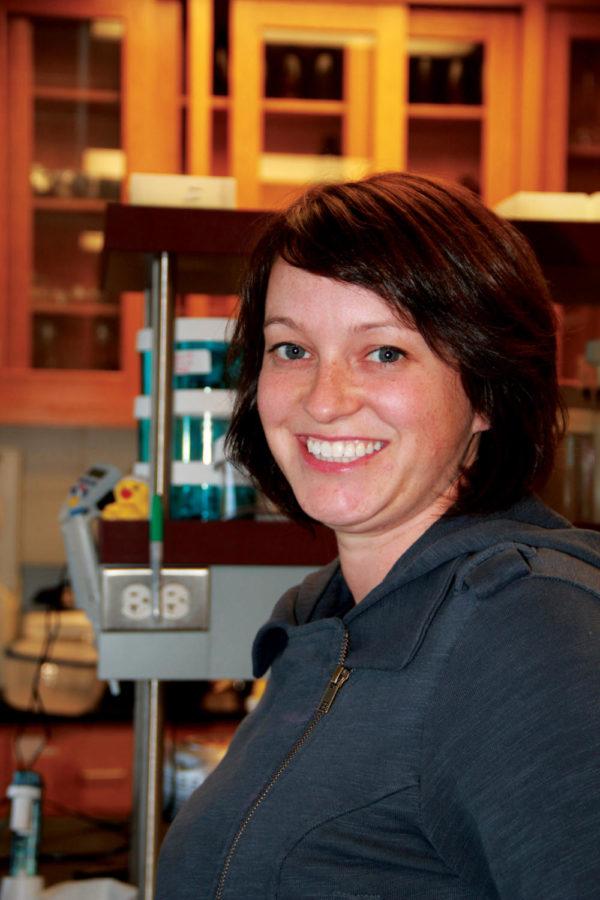Graduate student researches water pollution
Photo: Emily Harmon/ Iowa State Daily
Claire Hruby, a year and a half into her doctorate program, spends a large portion of her time in the lab. Hruby is doing research on bacteria transported into ground water. Hruby entered her field in particular for the travel opportunities, including one recent trip being to Jordan.
September 15, 2011
An ISU graduate student is contributing research to a long-term study on different land-management practices and their impact on water conditions.
Claire Hruby, Ph.D. student in agricultural and biosystems engineering, researches the ways in which the bacteria found in manure effects the quality of Iowa’s water.
“Our problems are mostly related to the fact that we have lots of land used for growing crops, because that requires fertilizers and other chemicals,” Hruby said.
Hruby’s work involves fertilizing plots of soil with poultry manure, growing corn on that soil and then collecting samples of the water that filters through.
“In Iowa, we have this lovely system of drainage tiles,” Hruby said. “Most of Iowa would be a swamp if we didn’t artificially put a pipe down into the ground to drain the water out. Our field setup has these tiles underneath plots, and we can look at the water coming out.”
In the lab, Hruby tests water samples for the presence of certain types of bacteria that can cause health problems.
“Iowa’s water quality standards are based on E. coli, which is not necessarily bad for you,” Hruby said, “but if you have more of it, it means all the other things that come along with manure or human waste could be there.”
E. coli is a good indicator of salmonella, which is always harmful, Hruby said.
“If you’re looking at public health, or if you’re trying to tell farmers how to improve their practices, you have a lot more credibility when you can say, ‘This is really the stuff that makes you sick,'” Hruby said.
It is unclear whether non-point-source bacteria pollution is on the rise, Hruby said, because research in this area began only recently.
“More and more streams and lakes are listed as impaired for bacteria — that means they don’t meet the standards for recreational use of the water,” Hruby said, “but part of the reason the numbers are increasing is because we monitor them more.”
Professor Michelle Soupir, Hruby’s adviser, said the project with which she is involved is unique in that it is funded by the Iowa Egg Council.
“They’re really interested in learning what kind of management practices would help to reduce the impact of land application of manure on water quality,” Soupir said. “Hopefully, at the end of the day we can make some recommendations … and then they can use that information to help inform their producers.”
ISU undergraduates often help Hruby gather water samples and perform the hundreds of tests necessary for obtaining accurate results.
“We grow a lot of bacteria, and they’re really helpful for that. If they’re really lucky, they actually get to count the bacteria on the plate,” Hruby said, smiling.
Hruby earned an undergraduate degree in geology and environmental science from Wesleyan University in Connecticut. After studying volcanoes in Greece, she returned to her home state of Minnesota for a year before moving to Iowa.
“I ended up doing a master’s degree in geology here [at ISU],” Hruby said. “Along the way I took some classes in hydrogeology and water contaminants, and that landed me a job at the Department of Natural Resources.”
Hruby’s work for the DNR mainly involves livestock operations, including the identification of land that is susceptible to contamination.
Hruby will graduate in approximately a year and a half. After that, she hopes to secure a teaching job.
“Ideally I’d get a faculty position and do research and travel and do work in other places,” Hruby said. “Agriculture and bacteria is everywhere.”
Hruby hopes to publish at least five scientific papers based on her current research, once it is complete. Of these, she hopes at least one will address the policy repercussions created by work like hers.
“[Hruby] has a great perspective because she has experience with the DNR, and now she can really use her Ph.D. research to help inform policy,” Soupir said. “She sees a real need for making her results useful to a more general audience. I think it’s really great to have that.”







